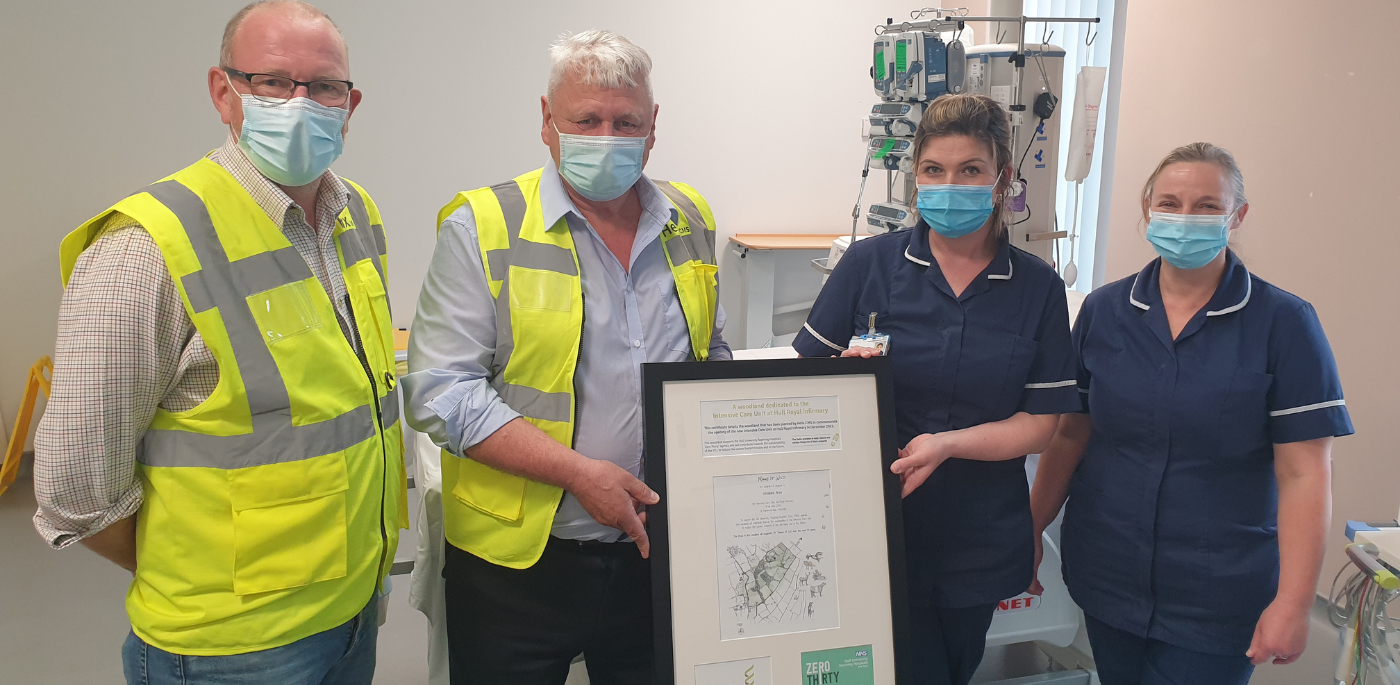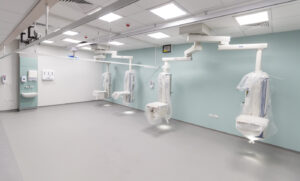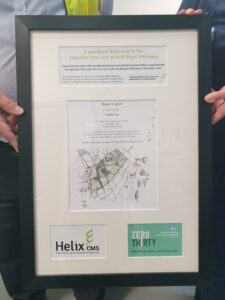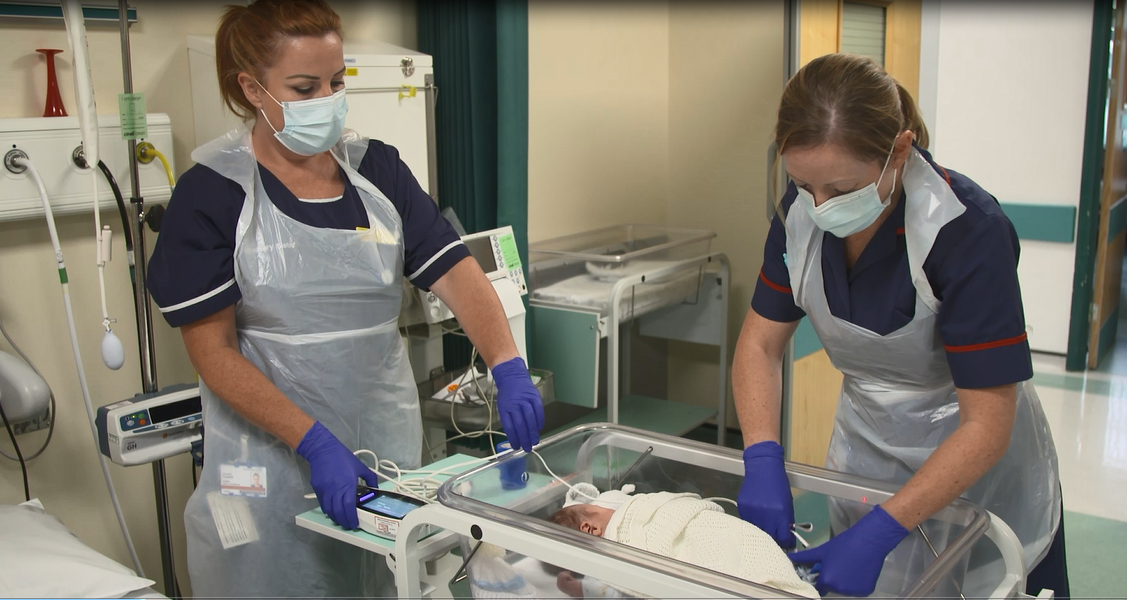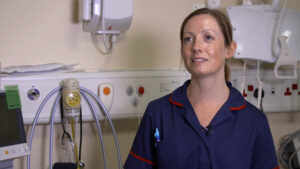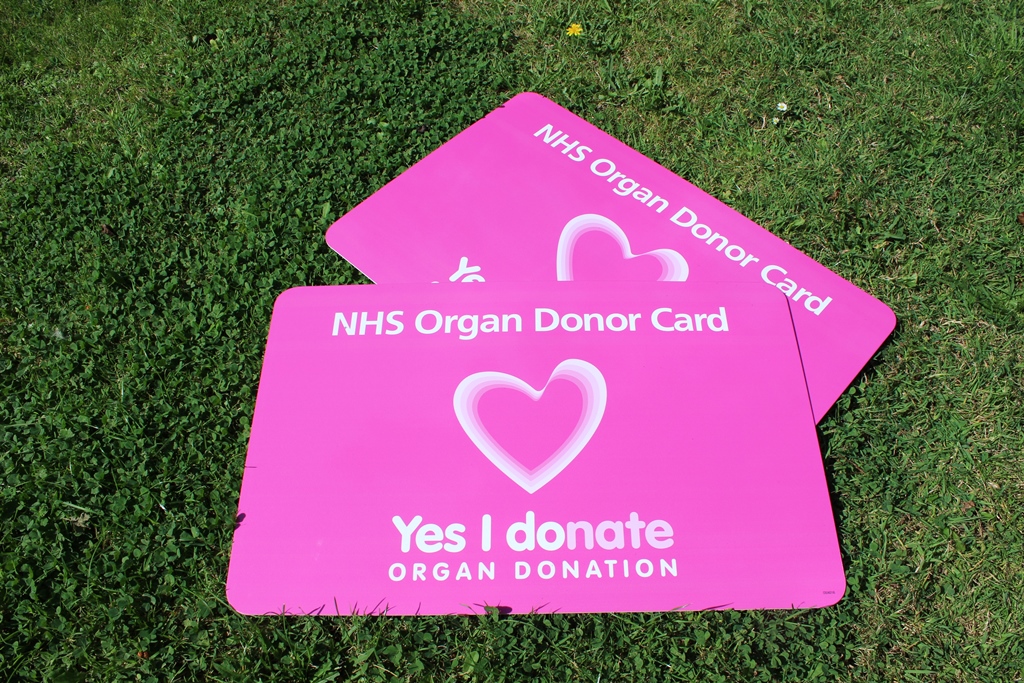The new WISHH Health and Wellbeing Suite was opened officially at Castle Hill Hospital today.
The £150,000 suite has been created by our friends at WISHH, the independent charity supporting Hull’s Hospitals, as a safe haven for staff to relax and recharge their batteries.
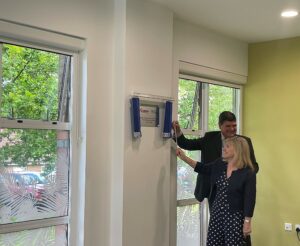
Chris Long and Sue Lockwood open the suite for staff
Chair of WISHH Sue Lockwood and Chris Long, Chief Executive of Hull University Teaching Hospitals NHS Trust, performed the official opening at a special event with WISHH trustees and staff connected with Up! – the trust’s programme to support staff’s health and happiness at work.
Simon Nearney, Director of Workforce and Organisational Development, said: “The support we were receiving from WISHH was already fantastic but the new WISHH Health and Wellbeing Suite takes it to a whole new level.
“It is a wonderful facility and a real asset which our staff can use for their downtime. It’s a beautifully designed and decorated space, somewhere people can come for quiet contemplation or to take part in our fun activities.

Chris Long with the WISHH trustees
“WISHH was standing shoulder-to-shoulder with us from before the pandemic began but has remained by our sides as we continue to deal with Covid-19 and all the associated pressures. We can’t thank them enough for their unending support and all they have done for each and every one of us.”
Sue Lockwood, Chair of the WISHH Charity, said: “Thank you to everyone who responded so generously to the WISHH Covid-19 Appeal launched at the very start of the pandemic to support hospital staff.
“Without your tremendous generosity, creating this much needed facility would not have been possible.
“The opening of this Health and Wellbeing Suite, designed through close working with the users, means that the financial support from our community throughout the pandemic has been translated into a lasting thank you to NHS staff.”

Members of the Wednesday Walkers, one of the health and wellbeing groups run by Up!
WISHH’s Covid-19 Appeal, supported by the public, businesses, Hull Live’s Helping Hull’s Hospital’s Appeal and charities in Hull and the East Riding, raised a staggering £78,000 for the suite as one of its long-term legacy projects to support staff at Hull. WISHH were also successful for securing funds from NHS Charities Together, the charity supported by the late Captain Sir Tom Moore, receiving £72,000 to make the suite a reality.
The suite, next to Nightingales Restaurant, has two large rooms, separated by a foldable partition to create one larger space. It has two showers for staff to get washed and changed after cycling or running to work or taking part in our trust activities.
It also has a bank of key-operated lockers for staff to keep items like cycling helmets or running shoes.
The suite has a dedicated focus on staff health and wellbeing so the rooms will be used for that purpose by staff. Bookings will be controlled by the Organisational Development team to uphold the centre’s founding principles.
Lucy Vere, Head of Learning and Organisational Development, spearheads the staff support programme, helping staff who may be struggling to cope with the ongoing pandemic and daily pressures they face.
She said: “We now have a safe accessible space where individuals and teams can get away from their busy working environments.
“With comfortable seating alongside wellbeing resources, this suite is a dedicated and beautiful environment to provide staff support services such as one-to-one counselling and wellbeing sessions, all in a purpose-built space.”
Staff have already been taking part in Up! activities in and around the suite ahead of the official launch, from travel planning to help staff get to and from work to yoga, woodwork and Sound Baths for staff groups. It is also the meeting point for the Wednesday Walkers each Wednesday lunchtime at noon and the Bike Users’ Group, held on the second Wednesday of every month.
Education and Development Advisor Ben Greenwood, a keen cyclist who is also one of the Wednesday Walkers, said: “The new suite looks fabulous and will be a great place to meet new people, take part in the Up! activities and also have some space with your thoughts.”
WISHH are exploring possibility of creating a second WISHH Health and Wellbeing Suite at Hull Royal Infirmary in the future.
Who are WISHH?
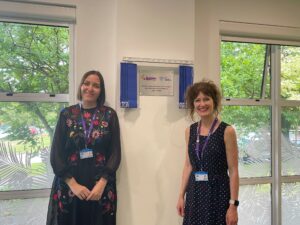
WISHH team Lisa Whitton (right) and Abby Wardill
WISHH is an independent charity, which both raises and manages funds raised for the benefit of both Hull Royal Infirmary and Castle Hill. The trustees are supported in this work by David Haire, Fundraising Director, Lisa Whitton, its Charity Manager, the exceptionally cheerful face of WISHH so familiar to many around the trust, and Abby Wardell who provides vital support to ensure their many fundraising projects run smoothly.
Since it was founded in 2016, WISHH has supported a wide range of projects across the trust including a Reminiscence Cinema on Ward 80 as well as other dementia-friendly improvements in the Department of Elderly Medicine.
Staff rooms have been enhanced across both hospitals. Additional wheelchairs, bed weighters for bed-bound patients, ventilators for NICU, syringe drivers for palliative care patients, complex needs cots and beds for the Paediatric High Dependency ward, along with Airvo breathing machines for Children’s ED have all been provided by WISHH.
These are just a few ways WISHH have helped make a difference to patients, their loved ones and staff across the trust.
The team has also been promoting events for staff to help them raise funds including the Virtual London Marathon and Hull Run for All. Future events for staff, families and friends include a Three Peak Challenge and a fun Colour Run.
Throughout the pandemic, the charity has been there for our staff, providing “pick me ups” to those working on the frontline as well as gifts, sweet treats, hampers and mementoes like sunflower seeds to bring some happiness into our lives.
WISHH has also been a major supporter of Up! – the trust’s health and wellbeing programme aimed at helping staff stay healthy and happy at work.
They have funded many initiatives including Up! lunch bags for our healthy lifestyle group, formerly Lockdown Losers but now Healthy, Happy HUTH, hi-vis vests and tabards for our cyclists and runners and seeds, plants and items for flower arranging for the HRI Gardening Club and treats for the Wednesday Walkers.
WISHH is also supporting Up! in our plans to create more cycle shelters at Castle Hill Hospital and our plan to train one of the HUTH Harriers as an official England Athletics registered running coach.










 Joel Wainman, who has worked at Hull University Teaching Hospitals since 1990 and is known throughout Hull Royal Infirmary as a stalwart of the Post Room, was diagnosed with the life-limiting condition earlier this year.
Joel Wainman, who has worked at Hull University Teaching Hospitals since 1990 and is known throughout Hull Royal Infirmary as a stalwart of the Post Room, was diagnosed with the life-limiting condition earlier this year.
 The longest route takes in the best and hardest climbs in the Yorkshire Wolds including the infamous Hanging Grimston and Acklam which test even the most seasoned cyclist.
The longest route takes in the best and hardest climbs in the Yorkshire Wolds including the infamous Hanging Grimston and Acklam which test even the most seasoned cyclist.
